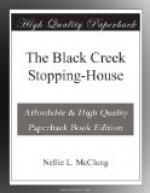They would celebrate the Twelfth! They would “walk.” He would gather up “the boys” and get someone to make a speech. They would get a fifer from Brandon. It was the fife that could stir the heart in you! And the fifer would play “The Protestant Boys” and “Rise, Sons of William, Rise!” Anyone that tried to stop him would get a shirt full of sore bones!
Thomas went home full of the plan to get back at the invaders! Rummaging through his trunk, he found, carefully wrapped with chewing tobacco and ground cedar, to keep the moths away, the regalia that he had worn, proudly and defiantly, once in Montreal, when the crowd that obstructed the triumphal march of the Orange Young Britons had to be dispersed by the “melitia.” It was a glorious day, and one to be remembered with pride, for there had been shots fired and heads smashed.
His man, a guileless young Englishman, came in from mowing, gaily whistling the refrain the Yankee band had been playing at intervals all afternoon. It was “Dixie Land,” and at first Thomas did not notice it. Rousing at last to the sinister significance of the tune, he ordered its cessation, in rosy-hued terms, and commended all such Yankee tunes and those that whistled them to that region where popular rumor has it that pots boil with or without watching.
Thomas Shouldice had lived by himself for a number of years. It was supposed that he had a wife living somewhere in “the States,” which term to many Canadians indicates a shadowy region where bad boys, unfaithful wives and absconding embezzlers find refuge and dwell in dim security.
Thomas’s devotion to the Orange Order was nothing short of a passion. He believed that but for its institution and perpetuation Protestant blood would flow like water. He always spoke of the “Stuarts” in an undertone, as if he were afraid they might even yet come back and make “rough house” for King Edward.
There were only two Catholic families in the neighborhood, and peaceable, friendly people they were, too; but Thomas believed they should be intimidated to prevent trouble. “The old spite is in them,” he told himself, “and nothing will show them where they stand like a ‘walk.’”
The next day Thomas left his haying and rounded up the faithful. There were seven members of the order in the community, all of whom were willing to stand for their country’s honor. There was James Shewfelt, who was a drummer, and could play the tunes without the fife at all. There was John Barker, who did a musical turn in the form of a twenty-three verse ballad beginning:
“When Popery did flourish in
Dear Ireland o’er the
sea,
There came a man from Amsterdam
To set ould Ireland free!
To set ould Ireland free, boys,
To set ould Ireland free,—
There came a man from Amsterdam
To set ould Ireland free!”




